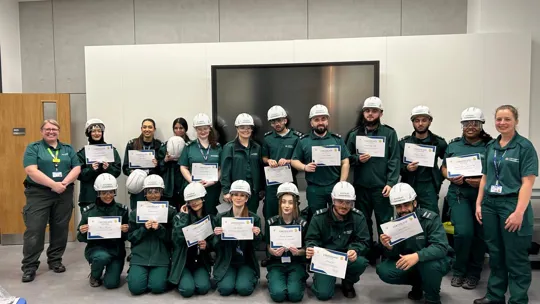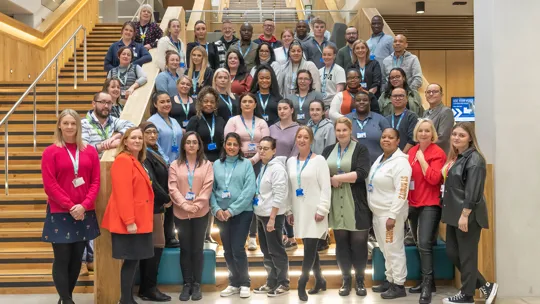of graduate employers say relevant experience is essential to getting a job with them
Why should I choose this mental health nursing top-up degree?
- AWARD WINNING PLACEMENTS – The university received the Student Placement of the Year: Hospital 2022 award at the Nursing Times Awards for 'authentic' placements, where nursing students manage real patient bays, and shortlisted for Best Student Experience and Nurse Education Provider of the Year in 2023
- TOP EDUCATION AWARDS ACHIEVEMENT – Our nursing courses foster excellence, demonstrated by Mike Blackham, a member of our first cohort who won Student of the Year at the Titan Awards
- STATE-OF-THE-ART FACILITIES – £44 million investment offers nursing students exceptional facilities, including a six-bed simulation ward and immersive VR technology, providing some of the best nursing training in the UK
- PERSONALISED APPROACH – Experienced lecturers promote a focused and supportive learning environment, ensuring students benefit from a personalised teaching experience
- STRONG EMPLOYMENT PROSPECTS – Graduates can expect high employability rates thanks to strong links with local NHS trusts and healthcare providers
- INDUSTRY-APPROVED TRAINING – Train to today’s gold standard in line with the NMC’s ‘Future Nurse: Standards of proficiency for registered nurses,’ and apply for Registered Nurse status upon graduation
Our facilities
As a student on our mental health nursing degree at University College Birmingham, you will have access to our Health Skills and Simulation Suite, featuring a purpose-built simulated clinical environment to help you practise your physical health skills and enhance your practical training. Our 360° immersive video room provides access to 200 interactive health and social care backgrounds, while we also have virtual reality software and a range of mental health-focused online case studies and scenarios, helping you grow in confidence in your mental health nursing practice during your nurse degree.
Course breakdown
Registered Nursing Associates enter the degree programme in Year 2 Semester Two and complete the following modules across 18 months:
- Modules
0 - 6 months
Nursing Practice - Part 2
This module will be delivered in the 2nd half of Part 2 of the BSc (Hons) nursing programme and is bespoke to Registered Nursing Associates entering the degree programme with 50% recognition of prior learning (RPL). The module will prepare you for your practice placements and practice-based learning opportunities that run across Part 2 of the programme and provides skills support to the theory units delivered in parallel. The module's focus is the development of professional values and the delivery of safe, holistic compassionate care. This module defines the skills and proficiencies student nurses require by the end of Part 2 as outlined in the Practice Assessment Document (PAD Part 2), prior to moving onto Part 3.
Long-term Mental Health Conditions
This module will consider the biological, psychological and social impact of long-term mental health conditions on an individual, using sources of information from clinical experts, service users, the evidence base and reflecting on clinical practice experiences. Students will be supported to develop skills and critical knowledge to enable them to apply it to safe care delivery, for individuals diagnosed with chronic long-term mental health conditions. The concept of shared decision making, and the role of multi-professional care will be explored. The module promotes critical thinking through the application of evidence-based practice. The aim of the module is to enable students to identify, discuss and analyse the impact of long-term mental health conditions on the service user, their family and/or support network, to enable students to critically discuss the shared decision-making process in the nursing care of people with long-term mental health conditions and comorbidities, using a multi-professional approach to care.
Acute Care in Mental Health
This module will enable you to build on previous knowledge of physiology, pathophysiology, psychophysiology, mental state presentations, anatomy and pharmacology knowledge acquired in Part 1, with a practical application to delivering care to patients experiencing acute and prolonged episodes of mental illness. You will be taught to recognise the care requirements and the nursing interventions for patients who are acutely mentally ill through simulated practice, with an exploration and evaluation of a range of assessment methods and tools as well as supporting physical health. The module aims to define ‘acute care’ delivered within the acute setting, so you understand the complexities of prioritising and providing acute care to patients who are experiencing acute illness and crisis and interventions may be required in response to their physical and mental health. Reference will be made throughout the module to the legal-ethical framework, policies and the evidence base that underpins safe practice delivery by nurses and the inter-professional team within the acute care environment, so that you can apply knowledge and skills into your practice. Legislative processes including the Mental Health Act (1983) and its application to practice will be taught. This module will enable you to build on your anatomy, physiology and pharmacology knowledge acquired in your Nursing Associate FdSc, with a practical application to a range of acute care scenarios affecting different body systems.
6- 18 months
Evidence Based Practice - Service Improvement Project
Service improvement is at the heart of how we ensure and improve the quality of the service-user experience. This module will provide you with the knowledge and skills to enable you to write a Service Improvement Project based on an evaluation of a student-selected aspect of a service in practice. Your project may relate to any aspect of a mental health service which could be improved, with an aim of enhancing the service-user experience. This might relate to care in a clinical or community setting or may be concerned with processes and resources. The project needs to identify how quality care may be enhanced and good practice disseminated. You will also include realistic recommendations for achieving this and a reflection on the personal and professional skills required for its implementation. In undertaking this module, you will receive practical advice, extend your academic knowledge, and have the support of a group of peers engaged in their own service improvement challenges. The four-week service improvement placement in week 3-6 of the module, will expose you to contemporary quality of care initiatives, audits, research projects, service improvements that are occurring within the organisation. Whilst working with your Practice Assessor/Practice Supervisors and the patient/client group, you will be able to explore your topic. You will receive practical advice, extend your academic knowledge, and have the support of a group of peers engaged in their own service improvement challenges. On return to university, you will use secondary evidence from a review of literature to appraise, evaluate and apply it to the service improvement issue. Within your summative report, you will be required to make analytical and objective judgements on the evidence and the potential impact on the quality and standards of care, safe working practices, risks, and service-user outcomes. The summative report will conclude with action plans and recommendations for change and clinicians and service users will be invited from partner organisations to support the assessment of the student verbal presentations of their improvement plan. Although you will not be implementing the project as part of the module, you will make an evidence-based plan to do so which you will present at the end of the module.
Nursing Practice - Part 3
This module will be delivered in part 3 of the BSc (Hons) nursing programme, preparing you for your practice placements that run across part 3 of the programme and prepares you for the third progression point and registration as a Mental Health Registered Nurse. The module's focus is professional values and the delivery of safe, holistic compassionate care and the assessment and management of patients with complex health care needs, in partnership with the service user and the inter-professional team. You are taught skills in small groups using skills equipment, mannequins, low and high-fidelity simulation and Virtual Reality. You will engage with the 7 platforms and 2 annexes identified by the Future Nurse: Standards of Proficiency for Registered Nurses (2018), reflecting what the NMC expect a newly Registered Nurse to know and be capable of doing safely and proficiently at the start of your career. This module defines the skills and proficiencies you as a student nurse is required to achieve by the end of Part 3, as directed by the Practice Assessment Document (ePAD 3) prior to professional registration on the NMC register. Aims: To enable you to achieve the progression point criteria for Part 3 as set out in the Future Nurse: Standards of Proficiency for Registered Nurses (2018) To enable you to prepare for and consolidate practice learning opportunities including placements and simulation experiences.
Transition to Professional Practice in Complex Care Environments
This module will enable you to reflect upon your personal and professional growth throughout your degree; drawing on evidence of learning and development compiled throughout the programme. It will foster the development and application of leadership, management and inter-professional team working concepts, required for effective clinical practice and positive patient outcomes. This module will enable you to reflect on the skills necessary to facilitate the transition to a Mental Health Registered Nurse. This module acknowledges that nursing care should take into consideration the individual's wishes, their culture and the services available within the current political landscape. It expands your consideration of the care environment and service provision to provide enhanced care delivery. This module examines the cultural, political and psychosocial influences in and on multi-disciplinary healthcare provision. Aims: To consolidate the knowledge and skills to support personal and professional development to become a Registered Nurse (Mental Health) in readiness to apply for NMC registration. To develop knowledge and skills related to leadership, management and team working within diverse and multidisciplinary healthcare settings.
The modules listed above for this course are regularly reviewed to ensure they are up to date and informed by industry as well as the latest teaching methods. On occasion, we may need to make unexpected changes to modules – if this occurs, we will contact all offer holders as soon as possible.
Entry requirements
Entry requirements
Academic:
GCSE/IGCSE English grade A*-C (grade 9-4) or equivalent.
Foundation Degree Certificate/ Transcript - FdSc Nursing Associate.
Evidence of completion of 1150 practice learning hours.
A university reference.
Evidence of Nursing and Midwifery Council Registration as a Registered Nursing Associate (PIN)
If you are unsure if your previous qualification is suitable, please contact us before completing an application. You can complete our enquiry form here or call us on 0121 604 1040
Recognition of Prior Learning (RPL)
Students can find further information regarding the Recognition of Prior Learning (RPL) and Recognition of Prior Experiential Learning (RPEL) for entry onto pre-registration nursing courses here.
Top up from Registered Nursing Associate to Registered Nurse
You can apply to ‘top up’ by gaining a place on the nursing degree programme using your foundation degree plus English and Maths Level 2 qualifications to meet the entry criteria.
On your UCAS application, you must clearly state in your personal statement that you wish to top up to the degree and that you are a Registered Nursing Associate, providing your NMC PIN in your personal statement.
Once your qualifications have been confirmed, if successfully shortlisted, you will be invited to interview.
If successful at interview, you will enter the degree programme at the 50% stage (i.e. halfway through the second year of the programme). You will complete 18 months of the degree programme, with placements, before you can register as a Registered Nurse and achieve your full degree.
You can ‘top up’ as an apprentice if your current Nursing Associate employer can support your application. Alternatively, you can self-fund and complete the 18-month top-up course full-time.
International students
Academic entry requirements: Please visit our Country Specific Information page.
NMC English Requirements:
To achieve NMC approval and successfully graduate, students must achieve the following.
IELTS score of 7.0 – a minimum of 7.0 in reading, listening and speaking, and a minimum of 6.5 in writing.
Occupational English Test (OET): an OET examination certificate – a minimum of grade C+ in the writing section and grade B in the reading, listening and speaking sections.
The Nursing and Midwifery Council updated this requirement in January 2020.
Combining OET test scores – you can achieve the required mark across two test sittings if:
- You sit the tests within six months of each other
- You are tested in all four sections at the same time
- All grades in both sittings are above grade C+, and you achieve at least a grade C+ in the writing section and at least a grade B in the reading, listening and speaking sections in either of the two test sittings
Further information regarding accepted English language tests can be found here.
Alternatively, if you do not have IELTS, you can take University College Birmingham's Online Proficiency Test – An overall score of C1 – a minimum of C1 in reading, listening and speaking, and a minimum of B2+ in writing.
Key information
Teaching and assessment
Note: Indicative information only – actual timetables and assessment regimes will be issued at your induction.
Teaching
Example of a typical teaching week (up to 21 contact hours - 3 days per week):
- Practical skills sessions
- Placements and simulated practice learning
- E-learning
- Small group teaching and discussion groups
- Seminars and lectures
- Self-directed study
- Action learning sets and peer mentoring schemes
You will also need to commit around 14 hours per week for individual study time – 2 days per week.
While your lessons will be timetabled into 3 days a week, it is worth noting that your course includes regular placements in addition to these hours.
Assessment
Estimated breakdown of assessment for this degree course:
- Coursework – 30%
- Practical assessment – 50%
- Written examinations - 20%
You will be assessed 50% in practice and simulation (minimum 1,150 hours) through completion of a Practice Assessment Document and Objective Structured Clinical Examinations (OSCEs).
The 50% theory (minimum 1,150 hours) is assessed through a variety of modes including written assignments, presentations, examinations, professional discussions and a portfolio of evidence.
You will be expected to demonstrate achievement of set competencies and outcomes at the end of each Part (end of Part 2) to enable progression to the next part or to complete the course (end of Part 3).
Our teaching and assessment is underpinned by our Teaching, Learning and Assessment Strategy 2021-2024.
Tuition fees for home students
If you're enrolling in this 18-month top-up course at University College Birmingham:
-
June 2025 start: Your first-year fee (6 months) is £4,625, and your second-year fee (full year) is £9,535.
-
February 2026 start: Your first-year fee (6 months) is £4,767, and your second-year fee is £9,535, though this may change based on government regulations and funding adjustments.
Kick-Start Scheme
As a new student studying this course full-time, you will receive £300 per year through our Kick-Start Scheme (UK students only, eligibility criteria applies). This scheme will support your studies and future career by contributing to course-related materials, uniform or selected items on campus. You may also qualify for an additional £500 per year.
Find out more about the Kick-Start Scheme here.
Unibuddy Community - meet other students on your course
Starting university is an exciting time, but we understand that it can sometimes feel a little daunting. To support you, you will be invited to join our Unibuddy Community, where you can meet other students who have applied for the same course at University College Birmingham, before you start studying here.
As soon as you have been made an offer, you will be sent an invitation email to complete your registration and join the Unibuddy Community. For more information, check out our Unibuddy Community page.
Work experience
Practice placements are vital for gaining real-life experience and for building your confidence and skills before you finish your course – and they may even lead to a job when you graduate. Our Health Placement Team ensure a diverse range of placements are provided to you.
Our mental health nursing top-up course features multiple placements in different environments, ranging in duration from four weeks to 14 weeks.
Participating in care delivered over 24 hours a day and 7 days per week is an integral part of the course, so you will be expected to adopt various shift patterns. Some placements may also be some distance from your home to enable you to experience different settings.
Work alongside experts in your sector
A snapshot of some of the employers we have worked with:
- University Hospitals Birmingham NHS Foundation Trust
- Birmingham Women's and Children's NHS Foundation Trust
- Sandwell and West Birmingham NHS Trust
- Birmingham and Solihull Mental Health Foundation Trust
- Birmingham Community Healthcare NHS Foundation Trust
- Birmingham and Solihull NHS Training Hub
- The Royal Orthopaedic Hospital NHS Foundation Trust

From ensuring the most accurate diagnoses to the ongoing education of the public about critical health issues, nurses are indispensable and the glue that holds a patient’s healthcare journey together. Our mental health nursing degree has been developed with practice learning partners, service users and carers to reflect the requirements and complexities of modern healthcare.
Career opportunities
Note: Some roles below may require further study/training. The roles and salaries below are intended as a guide only.
Mental health nurse
Average Salary: £33,951

Helen's Story
As a mental health nurse with more than 20 years of experience, programme lead Helen is eager to share her wealth of knowledge for working in this field.
Meet your lecturers



What’s happening

New paramedic science course students embark on first front-line placement
Students from the new Paramedic Science BSc course ventured out on placement for the first time this week.
Read more
Healthcare heroes: first nursing and physiotherapy graduates celebrate
The first cohorts from University College Birmingham's Nursing (Adult) BSc (Hons) and Physiotherapy BSc (Hons) programme…
Read more
Emotional celebration for first nursing cohort who started at height of pandemic
There were emotional moments a-plenty for both students and teaching staff at a special celebration for Univer…
Read more
Shortlisted for best student experience in national nursing awards
University College Birmingham has been shortlisted for Best Student Experience in the national Student Nursing Times Awards…
Read more
Mental health nursing degree launched to meet shortage of frontline workers
University College Birmingham has invested in a raft of cutting-edge technology to support students on its new ment…
Read more
Nursing graduate who found his calling during degree wins student of year
A recently-qualified student who was part of the very first cohort of the University’s adult nursing degree at the he…
Read more
"Authentic" hospital placement wins at Student Nursing Times Awards
An "authentic" hospital placement opportunity available to University College Birmingham nursing and physiotherapy students…
Read more
Accelerated apprenticeship to turn nursing associates into full practitioners
A brand new accelerated degree apprenticeship to train nursing associates working everywhere from emergency wards…
Read more
Nursing associate apprenticeship offers specialist skills boost for health sector
A new apprenticeship programme at University College Birmingham is set to provide a boost for the health sect…
Read more


